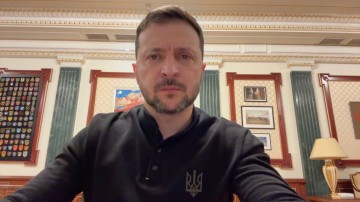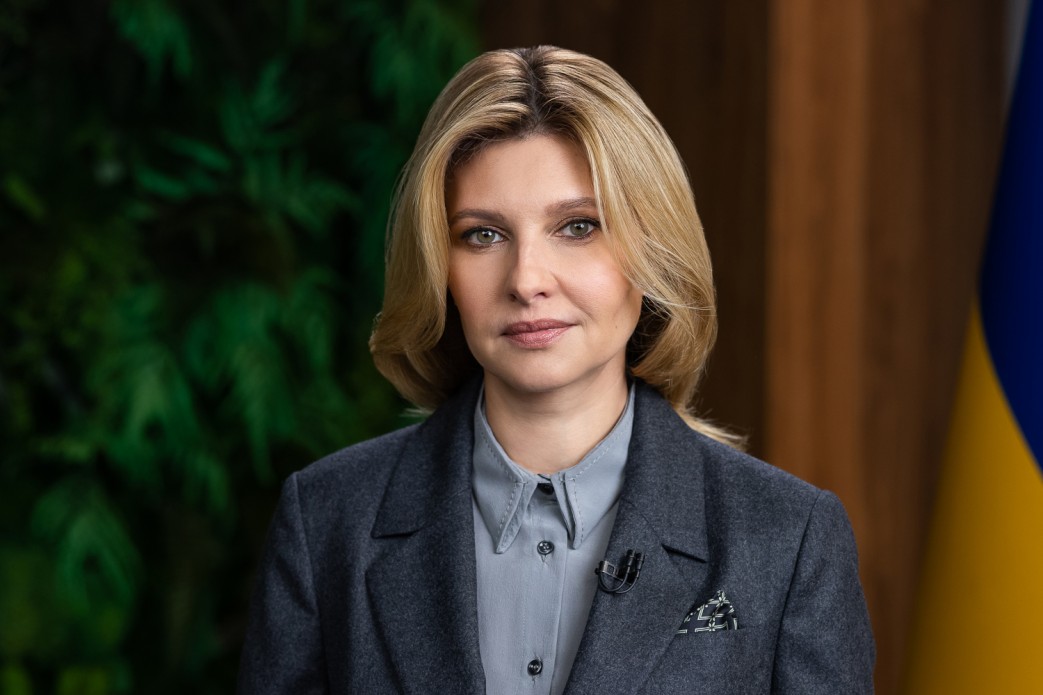First Lady of Ukraine Olena Zelenska sums up her work in 2022 in the field of mental health and psychosocial support.
As the President's wife emphasized, since February 24, Ukrainians have faced many new challenges and ordeals. One of them is the effects of full-scale war on mental health. As a study by the Gradus company, conducted in the summer of 2022, showed, more than 70% of Ukrainians feel stressed or very nervous.
"In order to overcome this challenge, I initiated the launch of the National Program of Mental Health and Psychosocial Support. The goal is to create our own Ukrainian model of the mental health and psychosocial support system, which will incorporate the best global and domestic practices. Among the tasks is to build an effective system of high-quality and affordable mental health services so that everyone who needs them can use them," said Olena Zelenska.
The development and implementation of the program is coordinated by the Ministry of Health in close cooperation with Ukrainian and international specialists. The initiative is implemented with the support of the World Health Organization.
The First Lady spoke about the stages of implementation of the National Program of Mental Health and Psychosocial Support - from the initiative to implementation.
International cooperation
The wife of the President promotes the attraction of international support and expertise, the unification of the efforts of all those who can provide assistance in the creation and implementation of the program. She held a series of meetings and phone conversations with the first ladies of other countries. At a meeting with the wife of the President of the United States of America, Jill Biden, in the White House, Olena Zelenska spoke about the need for consultations with American specialists to overcome the consequences of traumatic situations caused by war. In a phone conversation with the First Lady of Israel, Michal Herzog, the parties agreed that Israeli mental health specialists will provide expert support to their Ukrainian colleagues. The wife of the President of Ukraine agreed to study the experience of Belgium, which successfully reformed its mental health care system, during a phone conversation with Queen Mathilde of Belgium.
Olena Zelenska paid special attention to the issue of mental health of Ukrainians during her foreign visits. In particular, she discussed the creation of the National Program of Mental Health and Psychosocial Support with the head of the United States Agency for International Development (USAID) Samantha Power, the executive director of the United Nations Population Fund Natalia Kanem, and the Secretary of State for Health and Social Care of the United Kingdom Stephen Barclay.
During the meetings with Hans Kluge, WHO Regional Director for Europe, Olena Zelenska discussed expert assistance and support in the creation of the National Program of Mental Health and Psychosocial Support.
The First Lady spoke about the need to integrate psychological support in all spheres of life during her speech at the 75th session of the World Health Assembly, the highest governing body of the WHO.
Restoring the mental health of Ukrainians became one of the key topics of the second Summit of First Ladies and Gentlemen, which took place in the summer in Kyiv.
Development of the National Program of Mental Health and Psychosocial Support
On May 7, the Interagency Coordinating Council for the Protection of Mental Health and Provision of Psychological Assistance to Victims of Armed Aggression of the Russian Federation against Ukraine was established.
A project office was formed on the basis of the Ministry of Health, whose team is responsible for the development and implementation of the National Program of Mental Health and Psychosocial Support. For this, a multi-component approach is used, in particular:
- assessment of needs for today and forecasting how they can grow, taking into account the impact of the consequences of war on the psyche of people;
- analysis of international experience and how these needs are overcome in successful countries or in countries with similar experience;
- analysis of own resources - what we have and how it works: specialists, services, processes, infrastructure;
- proposal of effective solutions - what steps need to be taken to balance the demand from the population with the capacities and to give an effective response to the needs of the people.
On September 12-18, the Ukrainian delegation visited Belgium to study the experience of the reform of the mental health system and services. On November 10, a round table was held with specialists from Great Britain, who shared their country's experience in the development of the mental health care system.
Cooperation in this direction is also supported by the Representative Office of the United Nations Children's Fund (UNICEF) in Ukraine and the United States Agency for International Development (USAID).
In November, a Memorandum was signed between the Ministry of Health, WHO and 15 partners, aimed at building the capacity of primary health care in the management of common mental disorders, in particular stress-related, under the WHO Mental Health Gap Program (mhGAP). After completing the appropriate course, primary care workers will be able to provide care to patients with depression, anxiety, post-traumatic stress disorder, suicidal behavior, substance abuse, etc. As of December, almost 800 medical workers have been trained. Also, to scale this training, a corresponding online course was launched at the end of December.
In November, the Ministry of Health and the National Health Service of Ukraine introduced a new package "Support and treatment of adults and children with mental disorders at the primary level of medical care" in the framework of the Medical Guarantee Program.
On December 8, the Operational Roadmap "Priority multi-sectoral measures for mental health and psychosocial support in Ukraine during and after the war" was presented, which will enable a quick response to challenges here and now. The document identifies priorities that should be addressed by all those working in the field of mental health in the context of a humanitarian crisis.
The program also consults with WHO headquarters and interacts with the Technical Working Group on Mental Health and Psychosocial Support, which brings together around 270 partners.
An audit of the population's needs for mental health services was conducted.
The development of a communication campaign, which should form a culture of care for mental health in society and overcome stigma, is being completed.
Three strategic sessions were held, dedicated to the development of models of mental health and psychosocial support services for different target groups.
Training of specialists
In the framework of the National Program of Mental Health and Psychosocial Support, about 60,000 specialists have completed various forms of training.
A series of training sessions for trainers on the stress management course "Self-help plus" from WHO took place. Participants in the training were representatives of the Ministry of Health, Ministry of Social Policy, Ministry of Education, Ministry of Veterans Affairs, Ministry of Internal Affairs, Ministry of Defense, Ministry of Reintegration, as well as trainers from participating companies of the "Business without Barriers" community, in particular Ukrzaliznytsia, non-governmental and international organizations.
More than 25,000 teaching staff completed the training course "First psychological aid to participants in the educational process during and after the end of hostilities." This will make it possible to provide psychological first aid and emotional support to children and adolescents during the educational process.
The training of specialists also takes place in partnership with NGOs in Israel: the IsraelMedDay online conference was attended by more than a thousand specialists; about 3,000 specialists from the Ministry of Internal Affairs, employees of the education and social work sectors, Ukrzaliznytsia, Ukrposhta and Oschadbank received training from the Israel Trauma Coalition. More than 2,000 specialists listened live to 6 webinars from the Israeli Trauma and Resilience Center NATAL. About 160 operators of government hotlines have also received psychological first aid and stress management training.
On November 28, a joint project with IsraAID was launched, aimed at supporting people who have been in hospitals for a long time, as well as doctors and all medical staff of hospitals, because they, passing human stories and all the pain experienced and heard through them, need no less support. The project will be implemented in hospitals of Dnipro, Vinnytsia and Kyiv region, 60 specialists have already been trained.
Products and projects
The following products were developed in the framework of the National Program of Mental Health and Psychosocial Support:
- Handbook "Basic skills of caring for yourself and others".
- A new section of the "Handbook of Barrier-Free Environment" - "Ethics of interaction in times of stress".
- Stress management in the BetterMe app: Mental Health.
- Videos for TV "Tell me honestly, how are you?". Self-help kit from Ukrainian stars and TV hosts.
- A series of animated videos about the nature of stress, helping yourself and loved ones.
Useful materials on self-help and support for others, collected on the page: https://bf.in.ua/useful/
Pilot projects are also being launched within the program, which can later be scaled up. One of them was the psychological rehabilitation of children at the health and educational camp Gen.Camp in Spain. Two shifts took place under the patronage of Olena Zelenska, during which 58 Ukrainian children who suffered from Russian aggression were rehabilitated.
"The very first shift of the camp was unexpected for the specialists themselves: the children began to smile and dream. Live. It turned out that the child's psyche can withstand the most difficult tests, if the right therapy and timely help are provided. So our task now is to restore their faith in love and happiness, as their parents wanted. And we can already see that we are succeeding in this," said Olena Zelenska.
Assistance to children is provided free of charge on the initiative and at the expense of private Ukrainian patrons.
"Our goal is to create such a system that will provide access to psychological help and support for everyone who needs it. Launch an effective mechanism that will work for many years. So that services for people are of high quality and in the right place at the right time, in an understandable form. And the main thing is that they should be friendly: attract people and in no case push them away," the President's wife summed up.




